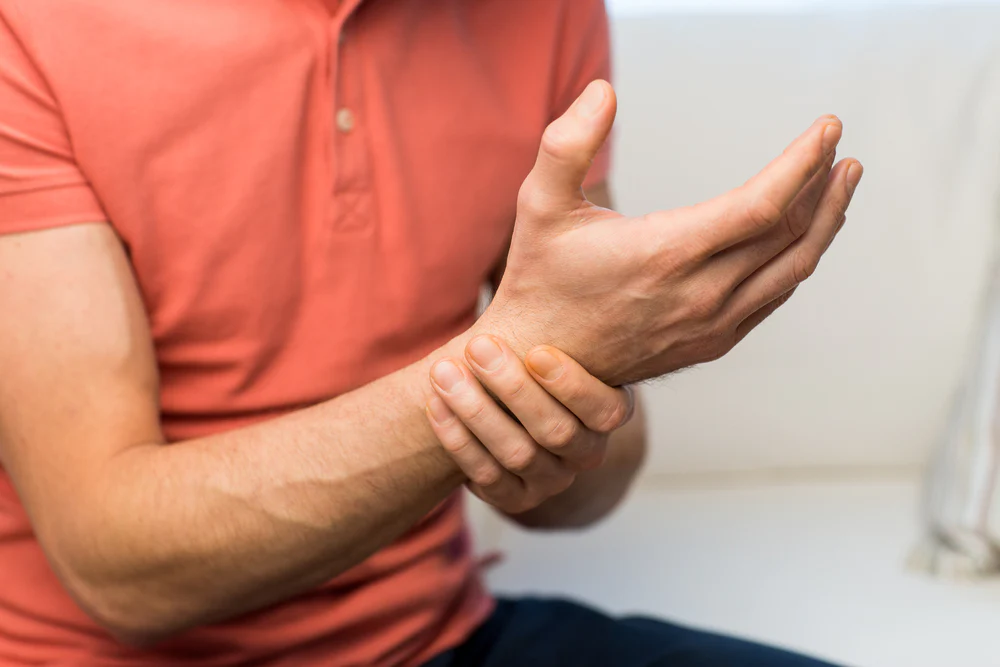Sleep Disorders and Conditions
When your Arms Fall Asleep: Causes, Symptoms, and Treatment
The most common cause of paresthesia is the temporary interruption of blood flow to a nerve, resulting in a "pins and needles" sensation that goes away quickly when you move the affected body part. However, chronic or recurring paresthesia can be a symptom of an underlying health issue. In this blog, we'll explore the possible causes of paresthesia, when to seek medical attention, and how it can be treated.
Have you ever experienced that pins and needles sensation in your arm, hand, or other body part? It's a familiar feeling for most people, usually caused by temporarily reduced blood flow or pressure on a nerve. Although it's typically painless and short-lived, sometimes it can linger or be a sign of an underlying health problem.
In this blog, we'll explore the common causes of paresthesia (the medical term for that tingling or numbness sensation) and what you can do about it. Whether it's a harmless annoyance or a potential warning sign, it's always wise to know the reason behind it.
Causes of paresthesia
The most common cause of paresthesia is simple: you're putting too much pressure on a nerve or reducing the blood flow to your nerves. This can happen when you fall asleep with your arm under your head, sit for too long with your legs crossed, or keep your elbow bent for an extended period.
However, if paresthesia happens frequently or lasts longer than a few minutes, it may indicate an underlying medical condition, such as:
Vitamin B deficiency: If you don't get enough B vitamins in your diet, especially B12, you may develop nerve damage and experience paresthesia. This is more common in older adults, vegans, heavy drinkers, and people with pernicious anemia.
Fluid retention: When your body retains too much fluid, it can cause swelling and impede blood circulation. This may result in paresthesia, particularly in the hands and feet.
Carpal tunnel syndrome: If you frequently use your hands and wrists in repetitive motions, such as typing or playing an instrument, you may develop carpal tunnel syndrome. This condition occurs when the median nerve in your wrist is compressed, causing pain, weakness, and tingling.
Peripheral neuropathy: People with diabetes are at risk of developing peripheral neuropathy, a type of nerve damage that causes paresthesia, pain, and weakness in the hands and feet. This happens because high blood sugar levels damage the nerves over time.
Other medical conditions: Some neurological disorders, such as multiple sclerosis or stroke, can cause paresthesia as a symptom. Tumors or growths in the brain or spine may also affect the nerves and trigger the sensation.
Symptoms and when to see a doctor
If you experience paresthesia occasionally, it's usually not a cause for concern. Repositioning yourself or massaging the affected area may relieve the tingling or numbness sensation. However, if the symptoms persist or occur frequently, you should seek medical advice.
Consult your doctor if you notice any of the following:
The sensation lasts for more than a few minutes or occurs frequently
The tingling or numbness is accompanied by pain or discomfort
You experience muscle weakness or loss of coordination
You have vision problems, difficulties with speech, or intense dizziness
The symptoms affect both sides of your body or progress rapidly
Treatment for paresthesia
The treatment for paresthesia depends on the underlying cause. If it's due to a pinched nerve or poor positioning, changing your posture or stretching may help. OTC pain relievers or cold compresses can also ease the discomfort.
If the paresthesia is caused by a medical condition, your doctor may recommend specific tests or therapies. For instance, if you have carpal tunnel syndrome, you may need wrist splints or physical therapy to relieve the pressure on the median nerve. In some cases, surgery or cortisone shots may be necessary.
What can be done to prevent paresthesia?
While it's not always possible to prevent paresthesia, there are a few things you can do to reduce your risk. These include:
Avoiding activities or positions that put pressure on your nerves or restrict blood flow. For example, if you spend a lot of time typing on a keyboard, take frequent breaks and stretch your hands and wrists regularly.
Eating a balanced diet that includes plenty of vitamins and minerals. This can help prevent deficiencies that may lead to paresthesia.
Managing underlying health conditions, such as diabetes or multiple sclerosis, that may increase your risk of nerve damage.
Maintaining a healthy weight and engaging in regular physical activity. This can help improve circulation and prevent fluid retention, which can contribute to paresthesia.
In conclusion, while experiencing a pins and needles sensation in your arms or other body parts is common and usually not a cause for concern, if it persists or is accompanied by other symptoms, it's important to consult with your doctor to determine the underlying cause. In some cases, paresthesia may be a sign of an underlying medical condition that requires treatment.
Sleep Disorders and Conditions
Sleepless in Psychiatry: Unraveling the Role of Sleep in Neuropsychiatric Illnesses
Sleep Disorders and Conditions
When Sleep Disorders Clock In: Insomnia’s Impact on Productivity of Young Adults
Sleep Disorders and Conditions
Why Does My Body Twitch When I Sleep
Sleep Disorders and Conditions
Hypnic Jerk: Why Do I Twitch in My Sleep?
Sleep Disorders and Conditions
When your Arm Falls Asleep: Causes and Treatments
Sleep Disorders and Conditions







